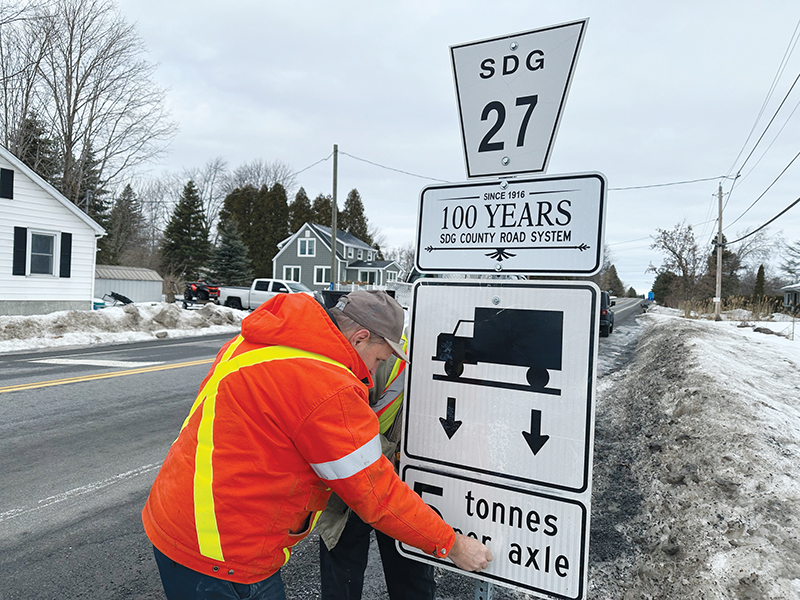Half load restrictions are in place for all of Stormont, Dundas, and Glengarry. The restrictions allow for just 5 tonnes per axle on a vehicle. This usually applies to large trucks carrying big loads. Courtesy Photo
SOUTH MOUNTAIN—With the arrival of spring-like conditions in Stormont, Dundas, and Glengarry it’s time to enforce half-load restrictions on the appropriate county and municipal roads in the region. The load limit is set at five metric tonnes per axle and will remain in place until the conditions that damage certain roads have changed.
To the average motorist driving to and from work or just driving around the countryside the half-load restrictions are not an issue. But for businesses that rely on heavy truck loads to do their job, the restrictions can affect their product output.
Sevita International, with offices in Inkerman and Woodstock, Ontario with a large processing plant off Sandy Row Road in South Mountain, has asked the North Dundas council to allow them to ignore half-load restrictions.
Respecting the half-load restrictions, according to Sevita general manager Sandy Hart will ultimately take a large bite out of its traditionally healthy financial outlook.
Hart and the vice president of operation Bob Hart made a presentation to the North Dundas council at their March 21 regular council meeting.
In a letter to the council before the meeting Sandy Hart wrote: “The issue of access to and from our processing facility on Sandy Row during half load season is very serious and poses an existential threat to our business.”
The letter continued, “We are requesting the council make a resolution to allow full loads to be shipped year-round between our facility and County Road 31 along Sandy Row, Pemberton Road and Hogaboam Road. We would further suggest that the speed limit on Hogaboam Road, Pemberton Rd, and Sandy Row be reduced to 50 km/hr.”
Bob Hart explained why Sevita’s request was appropriate considering the positive impact the company has had on the North Dundas and Agricultural community.
Sevita is the largest independent soybean company in Canada. The company was founded in North Dundas in 1997.
Its recent investment to date is a state-of-the-art seed and export facility that was built over the past eighteen months on Sandy Row. The expansion cost Sevita approximately $7 million. Since 1997, Sevita has invested over $17 million in infrastructure in North Dundas.
Sevita’s letter stated: “Due to this type of investment, throughout our company’s history, we have paid over one hundred and nine million dollars in premiums over and above the local price for commodity soybeans to our grower partners. In addition to this significant economic impact, we currently provide full-time employment to 37 people earning combined salaries of over two million three hundred thousand dollars annually at our facilities and office in Inkerman. There is no question that our ongoing investment and business activities in this township have delivered very significant economic opportunity for local farmers and well-paying local jobs with extended health benefits and a robust retirement program.”
Getting their product to market in Japan, Sevita has to navigate 4 km of road before it can get to County Road 31. These 4 km are classified as roads needing a half-load restriction.
“We have been pulling fully loaded twenty-foot shipping containers from our facility to County Road 31 and then on to the port of Montreal, ultimately destined for food manufacturers all around the world. The 4 km between our facility and County Road 31 represents the only area from our facility to Tokyo where there is an issue with the weight of our shipments, due to half load rules or other restrictions,” stated the letter.
Sandy Hart said, “For nearly a quarter century, we have not been made aware of any complaints from residents regarding our business activities or their impact on the condition of the roads between our facility and County Road 31.”
He said if the request was accepted, Sevita would add $20,000 to the cost of giving the roads they need to use a healthy gravel base. Following that Sevita would help the municipality out with looking after the roads with an annual $10,000 donation.
The council did not make any final decision at the meeting about granting Sevita’s request, but all councillors and the mayor said they appreciated the way Sevita had approached them, felt there might be a compromise that could be found after more discussion.

Joseph Morin is the Editor of the Eastern Ontario AgriNews, and the Record. He is, despite years of practice, determined to eventually play the guitar properly. He has served the Eastern Ontario community as a news editor, and journalist for the past 25 years with the Iroquois Chieftain, Kemptville Advance, West Carleton Review, and Ottawa Carleton Review in Manotick. He has never met a book he did not like.









